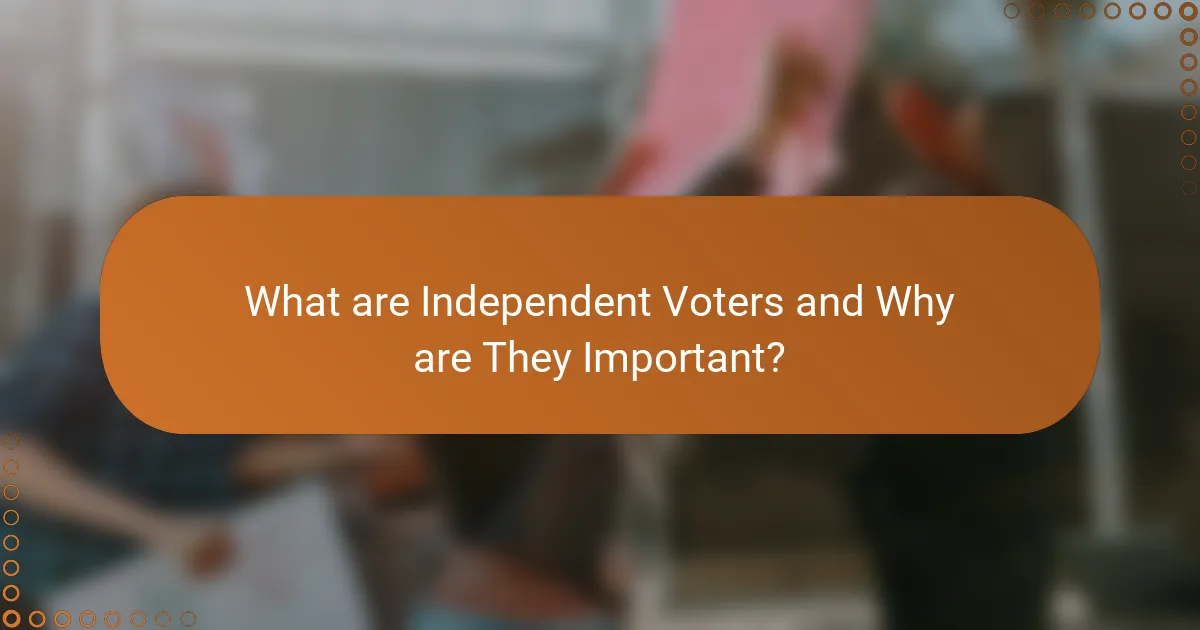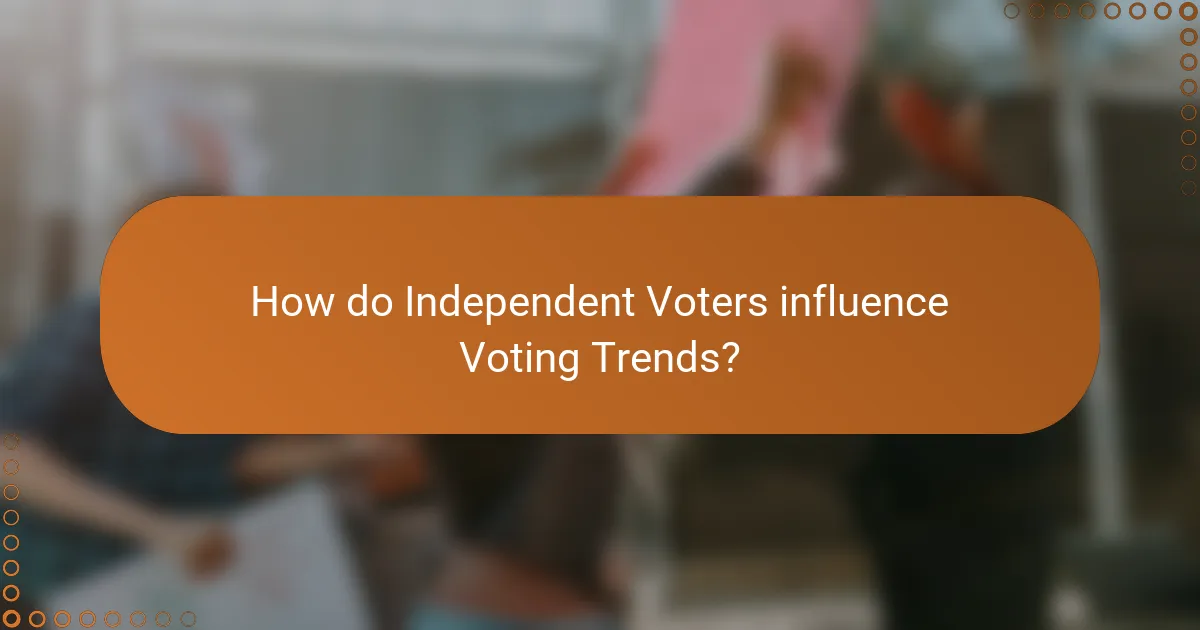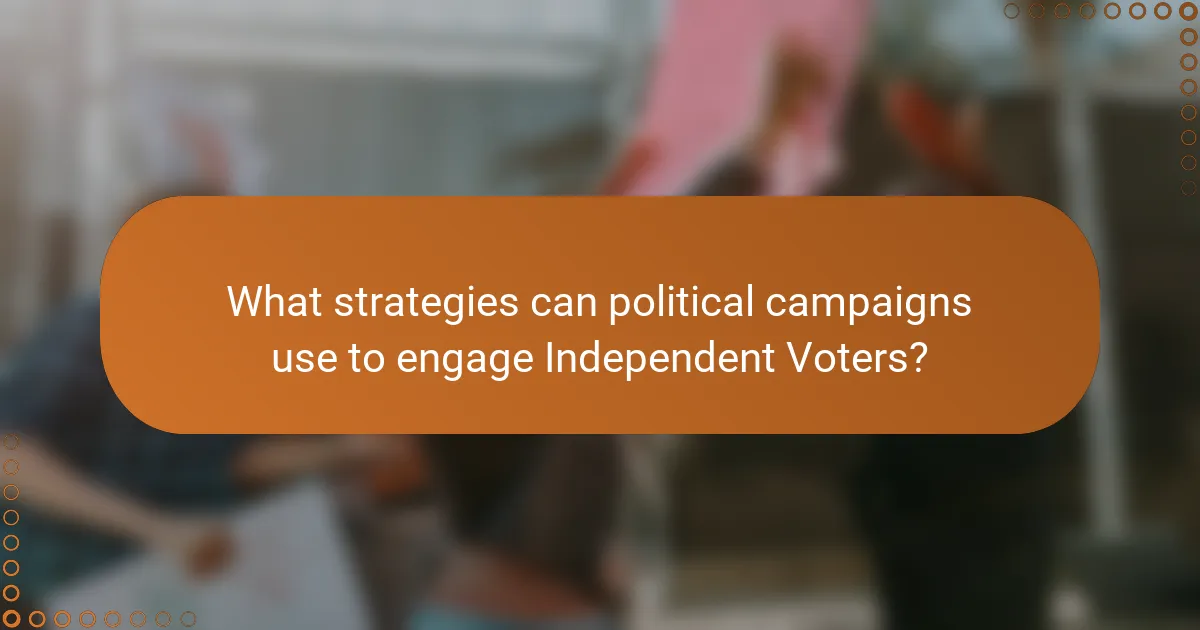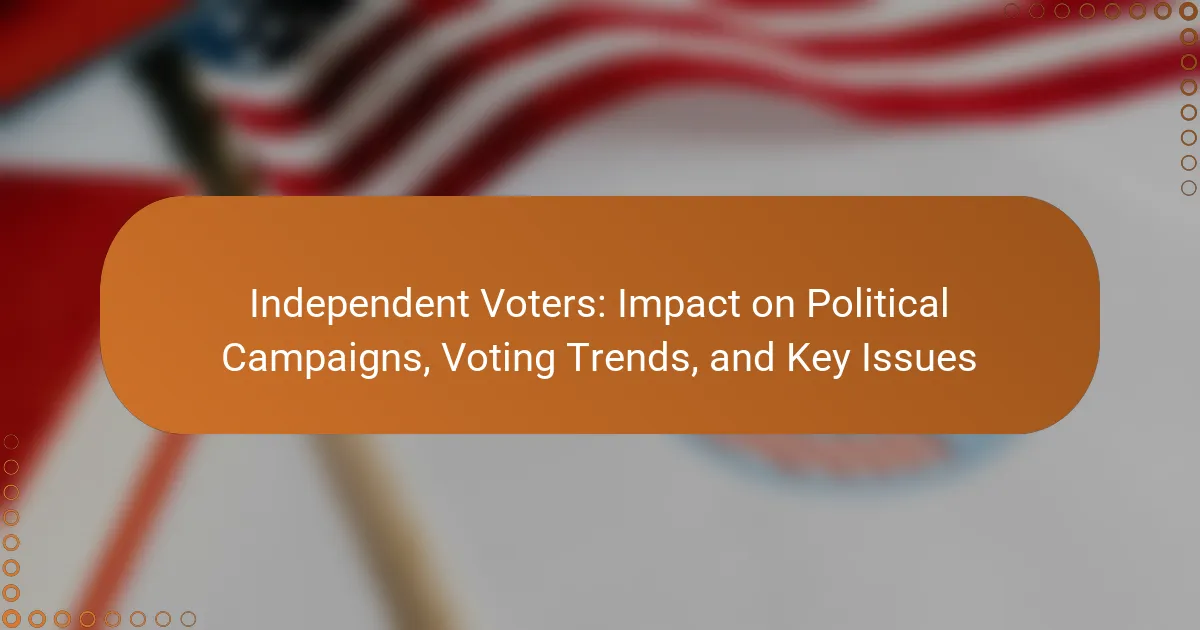Independent voters are individuals who do not affiliate with a specific political party, often registering as unaffiliated or selecting a party only during primary elections. They constitute a significant demographic in elections, influencing outcomes in closely contested races, as evidenced by their 35% participation in the 2020 U.S. presidential election. This article examines the impact of independent voters on political campaigns, their voting trends, and the key issues that resonate with them. It highlights how independent voters prioritize policy over party loyalty, shaping candidate strategies and platforms. Understanding their preferences is essential for political campaigns aiming to engage this critical group effectively.

What are Independent Voters and Why are They Important?
Independent voters are individuals who do not align with a specific political party. They may choose to register as unaffiliated or select a party only during primary elections. Independent voters play a crucial role in elections, often swaying outcomes in closely contested races. In the 2020 U.S. presidential election, approximately 35% of voters identified as independents. Their voting patterns can influence party strategies and candidate platforms. Understanding their preferences helps political campaigns target key issues effectively. Independent voters are important for fostering a more representative democracy. Their presence encourages political parties to address a broader range of concerns.
How do Independent Voters differ from other voter groups?
Independent voters differ from other voter groups primarily in their lack of affiliation with the two major political parties. They often prioritize issues over party loyalty, making their voting behavior less predictable. According to a 2020 Pew Research study, approximately 40% of U.S. voters identify as independents. This group tends to be more moderate compared to strong party affiliates. Independent voters often swing between parties in elections, influencing outcomes significantly. Their views on key issues can vary widely, reflecting a diverse set of beliefs. This flexibility makes them a critical demographic in political campaigns.
What characteristics define Independent Voters?
Independent voters are characterized by their lack of affiliation with major political parties. They often prioritize issues over party loyalty. Independent voters tend to be more moderate in their political views. They frequently engage in critical evaluation of candidates and policies. This group is known for its fluctuating voting patterns in elections. According to a 2020 Pew Research study, approximately 40% of U.S. voters identify as independents. Independent voters can significantly influence election outcomes due to their numbers. Their preferences can vary widely based on current political climates and key issues.
How do Independent Voters’ beliefs influence their political choices?
Independent voters’ beliefs significantly influence their political choices by shaping their preferences for candidates and policies. These voters often prioritize issues over party affiliation. For instance, they may support candidates who align with their views on healthcare, education, or the economy. Research indicates that independent voters are more likely to be swayed by a candidate’s stance on specific issues rather than party loyalty. According to a 2020 Pew Research study, 39% of independents stated that their views on issues were the most important factor in their voting decisions. This highlights how beliefs can lead to shifts in support during elections, impacting overall voting trends.
What role do Independent Voters play in political campaigns?
Independent voters play a crucial role in political campaigns by influencing election outcomes. They often determine the winner in closely contested races. According to a Pew Research Center study, independent voters made up 40% of the electorate in the 2020 presidential election. Their preferences can sway candidates to adopt more moderate positions. This demographic is less tied to party loyalty, making their votes unpredictable. Campaigns often target independents with tailored messaging. Engaging independent voters can lead to increased voter turnout. Their participation can reshape traditional party strategies and priorities.
How do Independent Voters affect campaign strategies?
Independent voters significantly influence campaign strategies. Candidates often tailor their messages to appeal to this demographic. Independent voters can sway election outcomes in closely contested races. Campaigns may focus on moderate policies to attract independents. Research shows that independents prioritize issues like the economy and healthcare. They tend to reject extreme partisan positions. This leads candidates to adopt more centrist stances. Engaging independents can increase voter turnout and broaden support.
What are the implications of Independent Voter turnout on election outcomes?
Independent voter turnout significantly influences election outcomes. Their participation can sway tight races. In 2020, 50% of independents voted, impacting key battleground states. High turnout among independents often leads to unexpected results. For example, their support for Biden in 2020 helped secure his victory in crucial areas. Independent voters tend to prioritize issues over party loyalty. This can shift campaign strategies, compelling candidates to address diverse concerns. Overall, independent voter turnout is a critical factor in determining election results.

How do Independent Voters influence Voting Trends?
Independent voters significantly influence voting trends by swaying election outcomes. They often decide close races due to their unpredictable nature. In the 2020 U.S. presidential election, 35% of independent voters supported Joe Biden, while 30% backed Donald Trump. Their preferences can shift based on current events and candidate appeal. Independent voters tend to prioritize issues over party loyalty. This makes them a critical demographic for candidates seeking to broaden their appeal. Their voting patterns can indicate emerging trends in public opinion. Tracking independent voter behavior helps analysts predict future electoral shifts.
What voting patterns are observed among Independent Voters?
Independent voters often display diverse voting patterns. They can swing between parties based on candidates and issues. In recent elections, approximately 40% of independent voters supported Democratic candidates, while around 30% leaned towards Republicans. This fluctuation indicates their potential to influence election outcomes significantly. Independent voters prioritize issues like the economy, healthcare, and climate change over party affiliation. Research shows that their voting behavior is less predictable than that of party-affiliated voters. This unpredictability can lead to shifts in campaign strategies from both major parties.
How do demographics impact the voting behavior of Independent Voters?
Demographics significantly influence the voting behavior of Independent Voters. Age, education level, and income are key demographic factors. Younger Independent Voters tend to prioritize social issues. Older voters often focus on economic stability and healthcare. Higher education levels correlate with progressive stances. Income levels can affect party alignment and issue prioritization. For instance, wealthier Independents may lean towards fiscal conservatism. According to a Pew Research study, 39% of Independents under 30 support progressive policies, while only 22% of those over 65 do. This illustrates how demographic differences shape voting preferences among Independents.
What historical trends have shaped Independent Voter participation?
Independent Voter participation has been shaped by several historical trends. The rise of third parties in the 19th century encouraged voters to identify outside the two major parties. The 1960s civil rights movement also prompted many to register as Independents, seeking alternatives to the mainstream parties. The Watergate scandal in the 1970s led to increased distrust in political parties, further boosting Independent registration.
In recent decades, polarization between Democrats and Republicans has driven voters to seek a middle ground. The advent of technology and social media has facilitated the organization of Independent voters. Data from the Pew Research Center shows that as of 2020, 40% of voters identified as Independents, reflecting a significant historical shift.
These trends demonstrate a growing desire for alternatives to traditional party politics among the electorate.
How do Independent Voters respond to key political issues?
Independent voters often express nuanced views on key political issues. They tend to prioritize issues like healthcare, economy, and immigration. According to a 2020 Pew Research Center study, 60% of independents identified healthcare as a top concern. Additionally, 55% expressed strong opinions on economic policies. Independent voters frequently seek candidates who align with their values rather than party affiliation. This group is known for being swing voters in elections, impacting outcomes significantly. Their responses can shift based on current events and candidate messaging. This adaptability makes them a critical demographic in political campaigns.
What issues are most important to Independent Voters?
Independent voters prioritize issues such as the economy, healthcare, and government accountability. Economic stability is crucial, as many independents seek policies that promote job growth and financial security. Healthcare access and affordability remain significant concerns, reflecting a desire for effective and equitable solutions. Additionally, government accountability resonates strongly, with independents often advocating for transparency and reduced political corruption. A 2020 Pew Research Center study found that 54% of independent voters consider the economy their top issue, while 48% prioritize healthcare. These statistics highlight the critical issues shaping the perspectives of independent voters.
How do Independent Voters prioritize these issues compared to party-affiliated voters?
Independent voters prioritize issues differently than party-affiliated voters. They tend to focus more on specific policy outcomes rather than party loyalty. Independent voters often emphasize economic issues, healthcare, and education. In contrast, party-affiliated voters may prioritize issues aligned with their party’s platform. Research indicates that independents are more likely to support bipartisan solutions. This contrasts with party-affiliated voters, who may resist compromise on key issues. A survey by the Pew Research Center shows that independents value pragmatic solutions over ideological purity. This demonstrates their unique position in the political landscape.

What strategies can political campaigns use to engage Independent Voters?
Political campaigns can engage Independent Voters by focusing on issues rather than party affiliation. This demographic often prioritizes policy over party loyalty. Campaigns should present clear, relatable messages that resonate with Independent values. Utilizing social media platforms effectively can also enhance outreach. Engaging in community events allows for direct interaction and feedback. Personalized communication through targeted messaging can increase relevance. Highlighting bipartisan support for policies can attract Independents. Research shows that 40% of Independents are open to candidates who prioritize issues over party lines.
What messaging resonates most with Independent Voters?
Messaging that resonates most with Independent Voters focuses on issues rather than party affiliation. Independents prioritize candidates who advocate for bipartisan solutions. They are attracted to messages that emphasize fiscal responsibility, healthcare reform, and education. Transparency and integrity in political messaging are crucial for gaining their trust. A 2020 Pew Research study found that 50% of Independents prefer candidates who challenge the status quo. Additionally, messaging that addresses local concerns tends to engage Independent Voters effectively.
How can campaigns tailor their outreach to attract Independent Voters?
Campaigns can tailor their outreach to attract Independent Voters by emphasizing issues that resonate with them. Independent Voters often prioritize economic policies, healthcare, and education. Campaigns should focus on presenting clear, actionable plans for these areas. Engaging in grassroots efforts can also enhance relatability. Utilizing social media platforms allows for direct communication and feedback. Surveys indicate that 60% of Independents value candidate authenticity. Personal stories and testimonials can create emotional connections. Lastly, fostering discussions on bipartisan solutions can appeal to their desire for pragmatic governance.
What role does social media play in reaching Independent Voters?
Social media serves as a critical tool for reaching Independent Voters. It allows political campaigns to engage directly with this diverse group. Platforms like Facebook, Twitter, and Instagram facilitate targeted messaging. Campaigns can tailor content to address specific concerns of Independent Voters. Research indicates that 62% of Independent Voters use social media for political information. This demographic values authenticity and direct communication. Social media also enables rapid dissemination of campaign messages. It fosters community discussions that can influence voter opinions. Overall, social media is essential for effectively engaging Independent Voters in political discourse.
What are the best practices for appealing to Independent Voters?
Engaging Independent Voters requires a focus on issues rather than party affiliation. Candidates should emphasize bipartisanship and present pragmatic solutions. Research indicates that 60% of Independents prioritize candidates who address their concerns directly. Tailoring messages to local issues is crucial, as 70% of Independents feel disconnected from national party agendas. Utilizing social media effectively can enhance outreach, as 80% of Independents use it for political information. Personal interactions, such as town halls, foster trust and connection. Highlighting transparency and accountability resonates well, with 75% valuing these traits in candidates.
How can understanding Independent Voter motivations enhance campaign effectiveness?
Understanding Independent Voter motivations can enhance campaign effectiveness by tailoring messages that resonate with their values. Independent voters often prioritize issues over party affiliation. Campaigns that identify and address these issues can attract more support. Research indicates that 40% of voters identify as independents, highlighting their significance in elections. Targeted messaging can increase engagement and turnout among this demographic. Campaigns that focus on key issues like healthcare, education, and the economy tend to perform better. By leveraging data on voter preferences, campaigns can refine strategies to connect with independents effectively.
What common mistakes should campaigns avoid when targeting Independent Voters?
Campaigns should avoid generalizing Independent Voters as a homogenous group. This demographic is diverse in beliefs and priorities. Failing to recognize this can lead to messaging that alienates potential supporters. Additionally, campaigns often make the mistake of relying too heavily on party affiliation. Many Independents do not identify with either major party. Ignoring this can result in ineffective outreach strategies.
Another common error is underestimating the importance of local issues. Independent Voters often prioritize community concerns over national party platforms. Campaigns need to address these local issues to resonate with this audience. Furthermore, campaigns should not overlook the significance of authenticity. Voters can sense insincerity, which can damage trust. Lastly, campaigns often neglect to engage Independents through digital platforms. This group frequently utilizes social media for information. Engaging them online can enhance connection and support.
Independent voters are individuals who do not affiliate with major political parties, often prioritizing issues over party loyalty, which makes their voting behavior unpredictable. This article examines the significance of independent voters in political campaigns, their impact on voting trends, and the key issues they prioritize, such as healthcare and the economy. It highlights how independent voters can sway election outcomes and influence campaign strategies, emphasizing the need for tailored messaging that resonates with their unique preferences. Additionally, the article discusses demographic factors that shape independent voter behavior and offers insights into effective engagement strategies for political campaigns.
